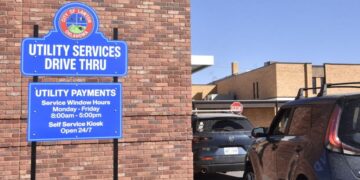Discussions about keeping the City Council start time at 6 p.m. and changes that could help lessen traffic congestion on Gore Boulevard will top the agenda when the council meets today.
Council members are being asked to get a head start on a decision they must formally post by Dec. 15: times and dates for regularly scheduled council meetings in 2025. Under the state’s Open Meetings Act, those details must be set and posted no later than Dec. 15, for the calendar year that begins Jan. 1, 2025, and City Clerk Donalynn Blazek-Scherler had been asking for direction on what start time council members want.
Tuesday’s agenda had given council members the option of discussing whether they wanted to keep what had originally been posed as a six-month trial when it started Aug. 13: moving the meeting start time to 6 p.m. That decision marked a return to what had been normal for years prior to 2020: evening start times. In 2020, council members and city administrators said a 2 p.m. start would be more cost effective because it would lessen overtime for some city employees and utility costs for evening sessions.
The return to 6 p.m. was a concession to residents who have said repeatedly it is difficult to get to council meetings at start in the afternoon of an average work day. Council members said the time change was calculated to make it easier for such residents to come to city hall, meaning greater public participation. That six-month pilot would have ended in February, but an agenda item amended late Monday now specifies regular meetings will remain at 6 p.m. through 2025.
Council members also will be reacting to complaints — theirs and constituents — by directing WSB to do a traffic study on Gore Boulevard between Northeast 45th Street and Northwest 82nd Street. The proposal requires the engineering firm to analyze traffic to determine what changes could help optimize signal light timing while maximizing traffic flow, according to the agenda commentary by Public Works Director Michael Watrous.
That study will focus on 6 miles of Gore Boulevard, both weekdays and weekends, and while Lawton Public Schools is in session so school traffic can be included in peak flow times. In addition to traffic patterns, analysis will include signal equipment and the communication necessary for implementation of new timing; cycle length and timing; and traffic signal light systems, to include the capabilities of existing equipment. Engineers said the goal of the $250,730 project is develop coordinated traffic signal timing plans for the length of the east-west arterial.
In other business, the council will receive a presentation from the Salvation Army about plans to assist the homeless population and that entity’s initiatives for winter.
The Salvation Army already agreed to provide open space on the south side of its Southwest E Avenue complex as designated outdoor space for homeless people who are removed from city parks and other public places under a new ordinance enacted in October that makes it illegal to camp in public places. Salvation Army Capt. Bryan Brinlee said his agency also will reopen its indoor shelters after renovations are done.
But, that may take some time and city officials want to address the challenges faced by homeless individuals as winter weather approaches.
Council members also will act on two lake-related issues: the search to find a new concessionaire for Ralph’s Resort concession at Lake Ellsworth, and getting an update — and potentially making a decision — on something that may have already been affected by more than 3 inches of rain over the weekend, lake elevations.
The lakes proposal, crafted before the drenching rainfall, is an update on the status of Lawton’s raw water supply in Lake Lawtonka, Lake Ellsworth and Waurika Lake. The three provide the water that Lawton’s two treatment plants turn into drinking water, but all three have been impacted by the drought that has held the area in its grip this summer.
An existing policy specifies actions to limit the outdoor use of water, based on lake elevations, and on Oct. 29, the combined total of all three lakes was 79.85 percent of their holdings: 85.33 percent for Lawtonka, 72.52 for Ellsworth and 81.71 for Waurika. Lawton hasn’t yet reached the first of its five stages for outdoor restrictions. Stage 1, imposed when lake levels are at 70 percent or less, limits outside water use to every other day. Stage 5, when lake levels are at 30 percent or less, bans outdoor water use. Lake sensitivity to drought is the reason city officials launched their groundwater well project, work to drill water wells into the Arbuckle-Timbered Hills aquifer under most of Comanche County.
Council members also will take a look at the Ellsworth concession of Ralph’s Resort, which has been operated by the Perry family for decades. Steve and Sandra Perry said earlier this year they would not renew their lease when it expires Dec. 31, and city administrators are searching for a replacement. The city has received four proposals, and city administrators want to present details about the concession property and get council input.
Want to reach a local audience and grow your business?
Our website is the perfect platform to connect with engaged readers in your local area.
Whether you're looking for banner ads, sponsored content, or custom promotions, we can tailor a package to meet your needs.
Contact us today to learn more about advertising opportunities!
CONTACT US NOW





